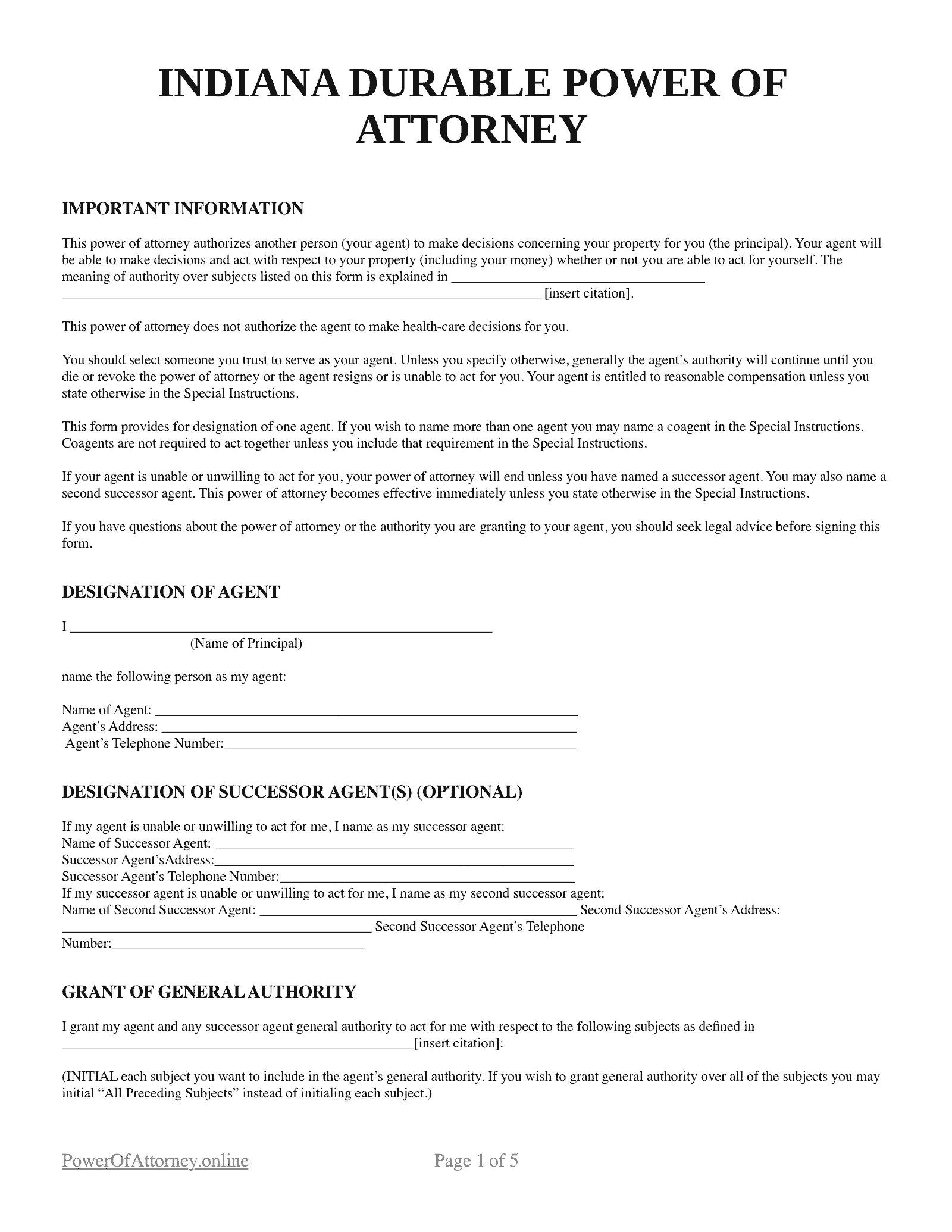Free Indiana Power of Attorney Forms
An Indiana power of attorney (POA) allows an individual to appoint another person to handle their important legal matters, usually concerning properties, finances, healthcare, and other personal accounts. The person who makes the appointment is referred to as the principal, while the empowered individual is called an agent or attorney-in-fact, which is the preferred term in Indiana laws.
It is an important document for the continuity of affairs in case the principal is not around to do business or sign paperwork. In other cases, the POA is vital in a person’s healthcare, especially when the principal becomes incapacitated and is unable to decide on treatment and other medical procedures.

Indiana Power of Attorney By Type
There are different types of POAs, and each has its own functions. Knowing their differences is key to creating and signing the right POA, whether you just want to authorize someone for one transaction or give them authority for a longer duration. Check out the major types of POAs:
- General Power of Attorney - This is the most widely used type of POA wherein the principal appoints an attorney-in-fact to handle their transactions, ranging from bank activities to selling or buying properties and more. The power or authority ends when the principal becomes too incompetent to make sound decisions.
- Durable Power of Attorney - This type of POA is necessary for a principal to continue managing their legal affairs even when they become incapacitated. The durable POA ends when the principal dies or when it is revoked.
- Medical Power of Attorney - This is a subset of durable POAs specific to a person’s medical and healthcare needs. When a principal becomes incapacitated, it becomes the agent’s responsibility to decide whether to accept or decline medical treatment and procedures on the principal’s behalf.
- Limited Power of Attorney - This POA specifies what the agent can do on behalf of the principal. It is mostly used for single transactions or for a limited time because the principal is out of town or unavailable for whatever reason.
How To Get a Power of Attorney in Indiana
There are various ways to get a power of attorney in Indiana. You can get a law firm to create one for you. But the most convenient way is to download a printable template that you can customize and sign. The signing must be done in front of a notary public for it to be legally binding.
Indiana Power of Attorney Laws
- Creation of the Power of Attorney - To be valid, the POA must be in writing and must identify the attorney-in-fact. The document must be signed in front of a notary public and becomes effective immediately unless otherwise stated. In cases where the POA takes effect when the principal is incapacitated, someone in authority must determine incompetence. This person could be a physician, licensed psychologist, or judge. (IC § 30-5-4-1, 30-5-4-2).
- Powers - The following are the powers that can be granted by an Indiana POA: real property transactions, tangible personal property transactions, bond and commodity transactions, retirement plans, banking transactions, business operating transactions, insurance transactions, and more. Among the most important matters handled by an attorney-in-fact are estate transactions and healthcare powers (IC § 30-5-5).
- Duties of the Attorney-in-Fact - The agent must keep all transaction records for at least six years from the transaction date or until they are given to a successor agent. Accounting is not necessary unless the court orders it. (IC § 30-5-6-4).
- Duties of Healthcare Providers - In the case of a medical POA, the principal’s healthcare provider must be furnished with a copy of the document, which will become a part of the principal’s medical records. “Whenever a healthcare provider believes a patient may lack the capacity to give informed consent to healthcare the provider considers necessary, the provider shall consult with the attorney-in-fact who has the power to act.” (IC § 30-5-7).
FAQs About Indiana Power of Attorney Forms
A power of attorney form in Indiana acts as written permission for an attorney-in-fact to act on behalf of the principal. The document can be used in various circumstances like banking, legal, and healthcare transactions. Here are the most common questions asked about POAs in Indiana: